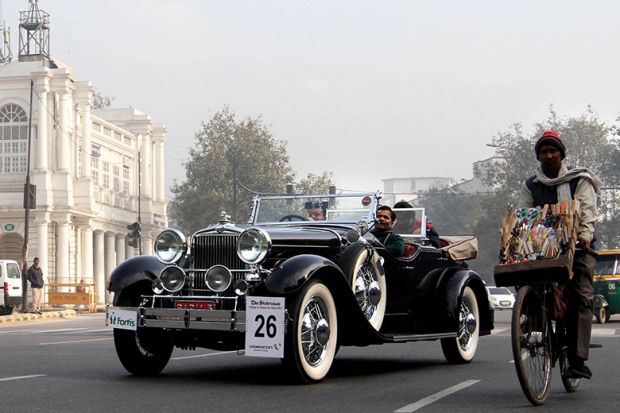After years of keeping thousands of teachers on short-term contracts, one of India’s largest universities is moving swiftly to replace them – prompting concerns about the fairness of the hiring process.
At the University of Delhi, which until recently employed 4,200 faculty on temporary contracts – about half its lecturers, many of whom had been in precarious positions for years – the hiring process is finally well under way. Last month, Delhi officially instructed its colleges to put an end to ad hoc appointments, according to reports.
But researchers say the process of filling teaching posts is seriously undermined by nepotism and the appointment of candidates favoured by politically aligned teachers’ unions.
“Recruitment has started in DU after a decade, but it has been marred by the replacement of longstanding ad hoc teachers by faculty belonging ideologically to the [ruling Bharatiya Janata Party], who have in many cases a very poor academic record,” said one academic at the university.
There was uproar in April following the suicide of a 33-year-old Delhi philosophy lecturer, Samarveer Singh, who took his own life after losing employment. But while protests took place, they were subdued – in part because Dr Singh’s colleagues were themselves scrambling to apply for permanent posts, scholars said.
Meanwhile, the process of replacing ad hoc teachers has continued unabated.
In Indraprastha College for Women, where the academic works, five sociology teachers with PhDs were “replaced by novices”, she claimed. She believed their appointment, and that of others, would do damage in the long run.
“Higher education institutions in DU have become a battlefield between merit and ideology…it is…a terrible onslaught on the university,” she said.
Elsewhere in India too, universities have long failed to fill permanent positions, said Apoorvanand, a Hindi professor at Delhi.
“This unsafe policy of not getting posts filled…is endemic. You go to Rajasthan or Uttar Pradesh and you’ll find it’s rampant. The posts are lying vacant…and students get enrolled at all departments, without teachers.”
Institutions can be slow to address the issue, in part because hiring fewer full-time staff means lower initial expenditure, less financial liability for tenured staff, and less money spent down the line on pay rises. Meanwhile, it is sometimes in the interest of teachers’ unions, who look to non-tenured faculty for votes, to keep their supporters in a vulnerable position.
While these are common factors across the country, the problem is particularly bad at Delhi, where it goes back for more than a decade, Professor Apoorvanand noted.
“You’ll have some teaching as ad hocs for 20 years. Now many of them are in their mid-forties, approaching 50, or have crossed 50.”
Professor Apoorvanand said that while offering permanent employment was a good idea in theory, the way recruitment has been conducted at Delhi cripples individuals’ careers, with candidates rejected by the college where they have taught for years facing a small chance of securing a job elsewhere.
“The appointment process is not transparent. Nobody knows what happens behind closed doors,” he said. “A seven-minute interview…can seal your fate.”
Having spoken to dozens of candidates for permanent posts, Professor Apoorvanand said he had heard the “same story” over and over again from applicants, who commonly felt that the outcome of their interviews had been predetermined.
“Sometimes their performance is excellent, it’s applauded by [the] selection committee, but they know beforehand the result. They’re offering themselves to be slaughtered…and it legitimises the selection process,” he said.
In response, Indraprastha College called the claims of nepotism in hiring “false allegations”. A spokesperson said that recruitment at both Delhi and Indraprastha was “based on the rules and regulations following a very transparent process” and that it had not received any queries or complaints from teachers.
“Teachers working on an ad hoc arrangement [are] not guarantee[d] to get a permanent appointment,” they added.
The Delhi University Teachers’ Association told THE that allegations of nepotism in the hiring process were “wrong and politically motivated”, adding that it has pushed for the permanent hiring of ad hoc teachers and helped more than 500 displaced teachers to find work in other colleges.
Register to continue
Why register?
- Registration is free and only takes a moment
- Once registered, you can read 3 articles a month
- Sign up for our newsletter
Subscribe
Or subscribe for unlimited access to:
- Unlimited access to news, views, insights & reviews
- Digital editions
- Digital access to THE’s university and college rankings analysis
Already registered or a current subscriber? Login








